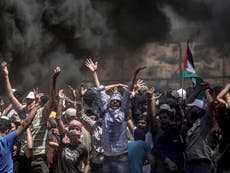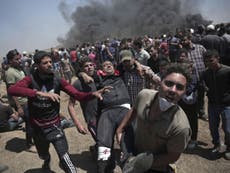I’ve been reporting on Gaza since 1993 – what I hear from Palestinians today tells me the situation has changed irreparably
The Palestinians of Gaza need more than expressions of sympathy if the killing is to stop

“It was terrible, it was a massacre, Sarah,” were Rema’s first words when I finally reached her at her Gaza home this morning. I was relieved to hear her voice as I knew she’d been to the buffer zone with her family to protest yesterday.
But she sounded sick. “It’s the tear gas, but I’m OK. But my little brother was shot in the leg. We didn’t know where he’d gone. He disappeared in the crowd. Then we lost him. Then someone said he’s in Shifa [hospital], go quick. We found him there. He was OK, thank god. His injury wasn’t so bad. But the bodies were everywhere.”
I asked how the rest of the family were.
“We’re all OK. My mum’s OK, but she’s frightened. She knew they were going to shoot us all. She predicted that.”
Looking at the media coverage of the Gaza protests it might appear that the world will intervene now to stop further slaughter.
The horror of the Gaza killings have dominated many front pages, along with protests from the United Nations and other world leaders calling for “restraint” and describing the shooting of unarmed Palestinians “tragic” and “sad”.
But the Palestinians of Gaza need more than expressions of sympathy if the killing is to stop. And they are well aware that world attention will move away from them again as soon as the drama of the killing fields dies down. They know also that any light shed on their own story will soon move away and their lives under siege will continue, hidden behind the barrier wall.
The Palestinians lost the military war with Israel as long ago as 1948 when they were expelled from their lands. In recent years, they lost the battle for most of their remaining land, as Gaza has been carved off the West Bank where Jewish settlement increases by the day.
More recently, the Palestinians have held out some hope that they might be winning back the “narrative war”. Following the collapse of the Oslo accords and the demise of the two-state solution, the younger generation of Palestinians in particular have had some success in reviving the narrative of their 1948 dispossession.
To some extent the Great Return March was intended to force the injustices of 1948 into the public eyes, as the centrepiece of the 70th anniversary of the Nakba (“catastrophe”).
Instead, events of the recent weeks, and particularly recent days, have shown that the Palestinians have lost the most important objective of all: to be treated as human beings.
I first encountered the human beings of Gaza when I visited the strip in 1993 and reported on the tail end of the first intifada. My first story in The Independent was headlined: “Gaza children live and die under the gun.” The situation was of course already tragic, but at least at that time the people of Gaza held a sense of pride in their ability to resist the occupation and there was a chance of peace, as talks were under way, issuing in the Oslo accord.
Moreover, the world still recognised the ground rules of the Palestinian case: that the Israeli occupation of Gaza, the West Bank and East Jerusalem was illegal and contrary to the Geneva Convention and to international law.
I returned in 2014 for the first time in many years to find those hopes of peace buried in the rubble of a war which had left nearly 2,500 people in Gaza dead. In the aftermath of the 2014 conflict world leaders expressed the same outrage they are expressing today but took no action, and the human misery deepened as the siege intensified.
On recent visits to Gaza I witnessed growing evidence of the despair that has led people to risk their lives by protesting at the buffer zone. The words of a Gaza teacher speaking earlier this year summed up the feeling: “People don’t think the world knows who they are any more. Nobody knows our story or cares.” A young woman lawyer put it like this: “They think we are animals and live under a stone.”
In early March I went to the buffer zone and spoke to some young protesters who were already risking their lives by throwing stones close to the fence. They seemed to have little care if they lived or died.
On my way out of Gaza a few days later I drove along the Israeli side of the border and saw Israeli soldiers, training with drones and establishing sniper positions. It was a sunny day and they seemed to be having a nice time. Looking back I realise they were preparing to shoot and kill the human beings who were planning to protest on the other side of the fence.
During my conversation with my friend Rema this morning, she also said she had been looking through the list of the dead from yesterday, and had seen the name of a neighbour. She was so frightened of seeing other names she knew she stopped reading. “But I looked on the Facebook posts of some of those killed and found they had written about how they were going to the buffer zone, and didn’t care if they died.”
“What are people saying is going to happen next?” I asked her. “Nobody knows,” she said. “But my mum thinks they’re going to bomb us next. Something more terrible will happen. A lot of people are saying that. What do you think?” she asked me.
I replied that I didn’t know. But given that the people of Gaza are not even viewed as human beings any more, her mum could be right.




Join our commenting forum
Join thought-provoking conversations, follow other Independent readers and see their replies